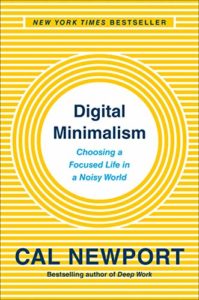
It’s amazing how fast life can change. When I think back 20 years ago, I spent time online, but not all the time. I would regularly check emails, and I might use the internet occasionally in the evening to check sport scores, read up on current events, or do some research. At most the internet was a diversion, a source of entertainment.
These days the internet is a pervasive, integral part of my life. I couldn’t do my work without it, and even when not working, I spend time online researching articles, or doing what I’m doing now – writing on my blog. Even when I’m not on my computer, I carry the internet around with me on my smartphone (currently using a Pixel 3 playing for Team Android). Not only does my phone keep me connected through voice calls and email, but I use it a lot for text messaging to keep in touch with friends and family.
For some, the connection goes even deeper. They are glued to the apps on their phone, whether it is Facebook, Twitter, Instagram, WhatsApp, TikTok, or whatever the latest social network du jour is. It begs the question, is there a point where you can be over-connected?
That’s the question that Cal Newport, author of Deep Work and others, explores in his book Digital Minimalism. He makes the case that are addiction to our smartphones and digital universe in general is not accidental, it is designed on purpose by the technology companies who package us for sell to advertisers for their gain. His contention is that our attraction to our screens is leading people to cede more and more of their autonomy as it relates to their attention. As such, he’s convinced that we need to implement a philosophy, rooted in deep values, that provides guidance on how we should use these digital tools. It’s a philosophy he terms Digital Minimalism, and the goal is to enable us to wrest control of our attention from the technology companies.
Newport defines Digital Minimalism as follows:
Digital Minimalism: A philosophy of technology use in which you focus your online time on a small number of carefully selected and optimized activities that strongly support the things you value, and then happily miss out on everything else.
In the book, he offers practical advice for implementing digital minimalism into your daily routine. His suggestion is to work backward from your deeply held values to your technology choices so you can transform these innovations from a source of distraction into tools you use to support the life you want to lead. Put another way, you flip the equation so you are using the tools for your benefit instead of the other way around, where the tools use you.
Newport’s prescription is not for the weak willed. He suggests starting with a digital detox. It requires spending 30 days off all of your social media services and time consuming apps. He’s convinced that by doing so, you will realize that you don’t need them to stay connected to those around you. He also recommends preparing for your detox. You need to determine what you plan to do with the time you will gain by not checking your phone every 30 seconds. Recommendations include taking long walks, purposeful journaling, having face-to-face conversations, joining something (in the real world), fixing or building things, and scheduling your leisure activities. In doing so, You fill your time and stay occupied rather than experiencing FOMO as you sit around idly wondering what to do with your new found free time.
Do I agree with Newport’s premise? Practically speaking, yes. Technology companies are in the business of commanding our attention and profiting from it. They have intentionally designed their applications, particularly their smartphone apps, to be as addictive as possible. Documentaries such as The Social Dilemma highlight exactly how these companies do it. However, I do feel that Newport’s suggestions are extreme. If you are going to follow his advice, you need to be prepared. I’d be concerned that going cold turkey could result in the same effects a drug addict experiences. If you are not prepared with activities fill your time, you might experience mood swings, depression, and potentially come back to your devices even more engaged than when you left them.
Overall, I would recommend Digital Minimalism. I wouldn’t categorize it as a Must Read, but if you’re struggling with the amount of time you’re spending online, you will pick up some excellent suggestions on how to reconnect with the offline world, (re)establish deeper relationships with those around you, and become more productive. Even if, like me, you haven’t fully succumbed to our digital overlords, it will reinforce the reasons you’ve chosen to stay away from these social media services. You’ll also pick up some useful practices to incorporate into your daily routine. Bottom line, I’m not suggesting you rush out to read Digital Minimalism, but I would definitely add it to your reading list and make a point of reading within the next year.
